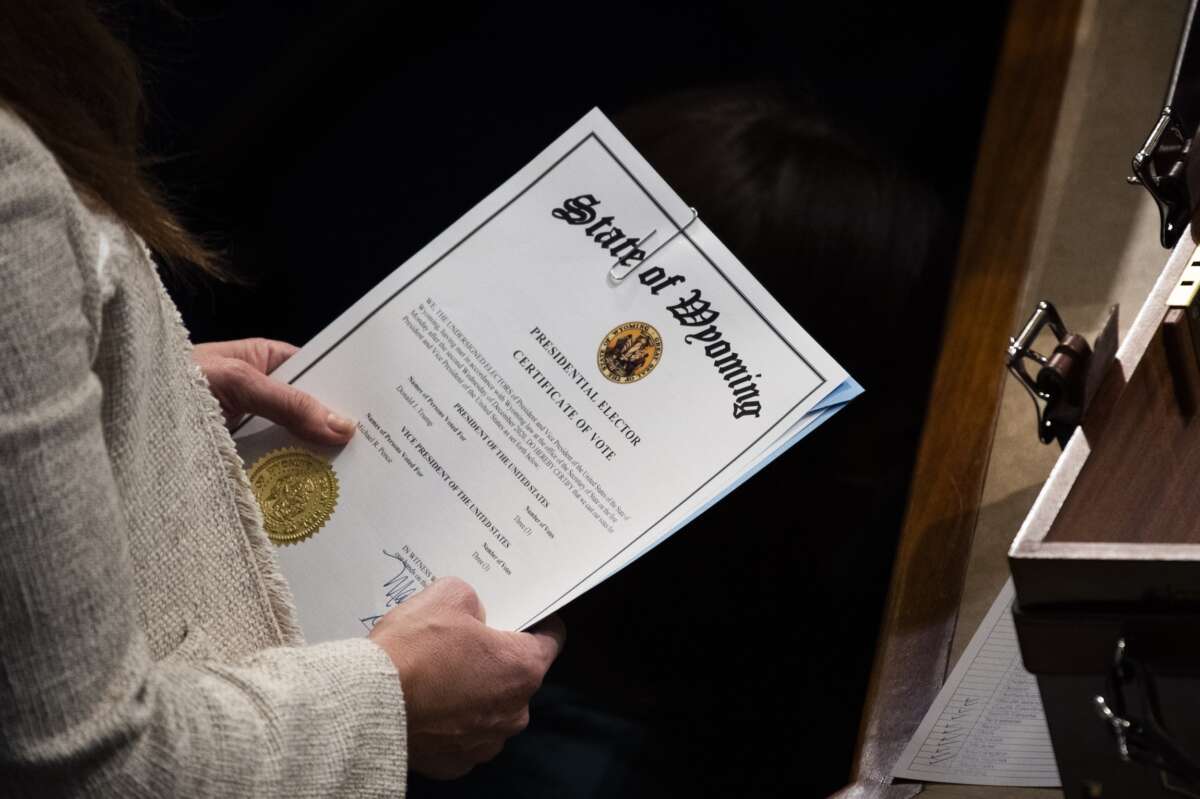The Trump campaign has selected dozens of election deniers — people who have pushed the repeatedly debunked lie that the 2020 election was “rigged” against Trump — to be included in its slate of electors in swing states this year.
The electors will take part in the Electoral College vote should Trump win in their jurisdictions. Their selection indicates that Trump’s strategy for this year’s election is likely similar to what went down in the 2020 race, when his campaign tried to overturn the results by sending fake electors’ votes to Washington from states that President Joe Biden won.
State parties, oftentimes in coordination with their corresponding presidential candidates, are tasked with selecting potential electors each presidential election cycle. The 30 electors the Trump campaign has chosen represent over a third of the 82 electors in the seven swing states for the 2024 race. Among those 30, nearly half (14) are people who were part of the fake electors plot of 2020.
Six of the electors the Trump campaign selected for its Michigan slate are former fake electors. In Pennsylvania, five are former fake electors; in Nevada, two were fake electors; and in New Mexico, one was a fake elector.
Wisconsin is the only state among those that had fake GOP electors in 2020 not to have any as part of its potential slate for Trump in 2024. This is because, as part of a settlement in a lawsuit against those individuals in the state, none of them may serve as electors, in any future presidential election, ever again. Notably, the fake electors plot originated in Wisconsin, where Trump lawyers Kenneth Chesebro and Jim Troupis — who developed the scheme — are from.
Some of the former fake electors who are part of the slate of potential electors for Trump in swing states this year are still facing pending criminal charges over their involvement in the plot to subvert the outcome of the 2020 election.
The fake electors scheme centered on submitting fake Electoral College votes for Trump from states that President Joe Biden had actually won — either to be counted within the certification ceremony for the Electoral College, or to sow confusion that would delay the election’s certification. The plan required then-Vice President Mike Pence, whose role as president of the Senate required him to oversee the counting of electors, to agree to recognize the fake electors.
Pence refused to do so, as the vice president does not have the constitutional authority to make such determinations. Trump derided Pence in the week leading up to the certification of the Electoral College, including in his incendiary speech on January 6, 2021, that prompted Trump loyalists to storm the Capitol to disrupt the election certification process.
The Trump campaign’s selection of dozens of election deniers, including electors who took part in the failed 2020 scheme, may signal that the former president plans to repeat that strategy should he lose to Democratic nominee Kamala Harris in this year’s race. Several sources close to Trump have indeed revealed that he is already planning to call into question this year’s election result if he is not the winner of the Electoral College.
For years now, Trump has maintained that a majority of voters believe that his 2020 election loss was due to widespread fraud — a claim that is contradicted by polling data.
“Eighty-two percent of the country understands that it was a rigged election,” Trump asserted back in March.
In reality, however, polls have consistently demonstrated that the vast majority of Americans recognize that Trump’s loss in the 2020 election was the legitimate outcome.
Angry, shocked, overwhelmed? Take action: Support independent media.
We’ve borne witness to a chaotic first few months in Trump’s presidency.
Over the last months, each executive order has delivered shock and bewilderment — a core part of a strategy to make the right-wing turn feel inevitable and overwhelming. But, as organizer Sandra Avalos implored us to remember in Truthout last November, “Together, we are more powerful than Trump.”
Indeed, the Trump administration is pushing through executive orders, but — as we’ve reported at Truthout — many are in legal limbo and face court challenges from unions and civil rights groups. Efforts to quash anti-racist teaching and DEI programs are stalled by education faculty, staff, and students refusing to comply. And communities across the country are coming together to raise the alarm on ICE raids, inform neighbors of their civil rights, and protect each other in moving shows of solidarity.
It will be a long fight ahead. And as nonprofit movement media, Truthout plans to be there documenting and uplifting resistance.
As we undertake this life-sustaining work, we appeal for your support. Please, if you find value in what we do, join our community of sustainers by making a monthly or one-time gift.
